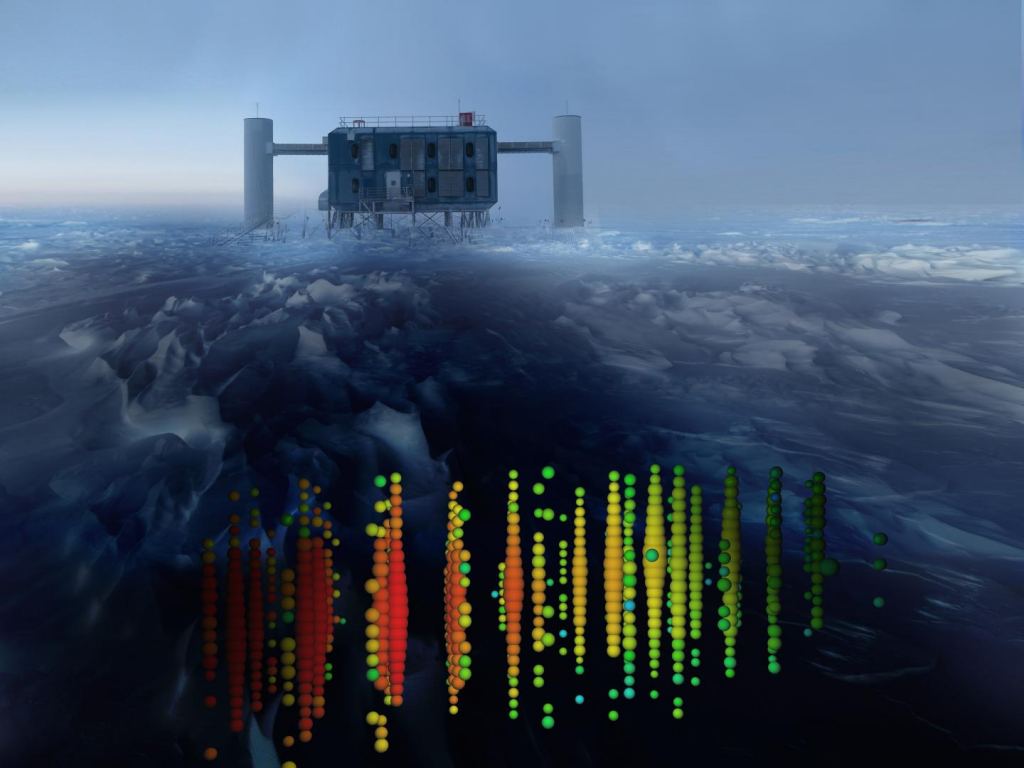The IceCube Neutrino Observatory , operated by the University of Wisconsin-Madison (UW-M), located at the Amundsen–Scott South Pole Station in Antarctica, is one of the most ambitious neutrino observatories in the world. Behind this observatory is the IceCube Collaboration , an international group of 300 physicists from 59 institutions in 14 countries. Relying on a cubic kilometer of ice to shield from external interference, this observatory is dedicated to the search for neutrinos.
These nearly massless subatomic particles are among the most abundant in the Universe and constantly pass through normal matter. By studying these particles, scientists hope to gain insight into some of the most violent astrophysical sources – such as supernovae, gamma-ray bursts, merging black holes and neutron stars, etc. The group of scientists tasked with advising the U.
S. government on particle physics research is known as the Particle Physics Project Prioritization Panel (P5). In a recent draft report, “ Pathways to Innovation and Discovery in Particle Physics ,” the P5 team recommended a planned expansion of IceCube .
This recommendation is one of several that define the future of astrophysics and particle physics research. The report also recommends support for a separate neutrino experiment based in Illinois called the Deep Underground Neutrino Experiment, along with multiple projects at CERN’s Large Hadron Collider , the Vera C. Rubin Observatory , the Cherenkov Telescope Array , and the development of next-generation ground-based telescopes to observe the cosmic microwave background (CMB).
The P5 advisors include two UW–Madison faculty members, Tulika Bose and Kyle Cranmer , and UW–Madison physicists also hold leading roles in the projects listed above. Bose is an experimental particle physicist who works on the Compact Muon Solenoid experiment at the LHC. Her research is focused on the search for exotic particles, Dark Matter, and Standard Model measurements.
Cranmer’s research is similarly focused on the search for exotic particles and physics beyond the Standard Model, which included the ATLAS experiment at the LHC. Together with their P5 colleagues, the two spent much of the last year assessing the future of particle physics and recommending projects that would help advance the field. One of the chief concerns of the P5 panel is how the federal government could maximize the limited funding it allocates to particle physics research over the next decade.
This is one of the main reasons for the recommended IceCube expansion, colloquially named ICECube-Gen2 . As they indicate in their report , an upgrade to the current observatory would be a relatively cost-effective way to improve the scientific community’s ability to detect and analyze neutrinos: “IceCube-Gen2 also has a strong science case in multi-messenger astrophysics together with gravitational wave observatories… The South Pole, a unique site that enables the world-leading science of CMB-S4 and IceCube-Gen2, must be maintained as a premier site of science to allow continued US leadership in these areas. ” “Using new technology and taking advantage of the brilliant ice that we can model with ever higher precision, IceCube-Gen2 can expand the detection volume by a factor of eight for a cost comparable to IceCube,” said Albrecht Karle , a UW–Madison physics professor who is leading the IceCube upgrade in a UW-M press release .
In addition to supporting an IceCube expansion and other major experiments, the panel recommended an improved funding balance between projects of all sizes, a more aggressive research and development program that could lead to a next-generation particle accelerator, and broadening the nation’s advanced technology workforce. Bose indicated that she is particularly excited by the prospect of a new particle accelerator, which could potentially be located in the U. S.
“I am excited by the bold long-term vision presented in the P5 report,” she said. “Such a collider would be an unparalleled global facility that will provide new insights into the mysteries of our quantum universe. ” The P5 panel’s recommendations are now being reviewed by the High Energy Physics Advisory Panel (HEPAP), part of the U.
S. Department of Energy (DoE), which is scheduled to meet on December 8th to discuss the recommendations. An online version of the P5 report can be found here on the DoE’s website, and a 2-page summary can be found on the HEPAP site here .
Further Reading: University of Wisconsin-Madison.
From: universetoday
URL: https://www.universetoday.com/164709/scientists-are-recommending-icecube-should-be-eight-times-bigger/



